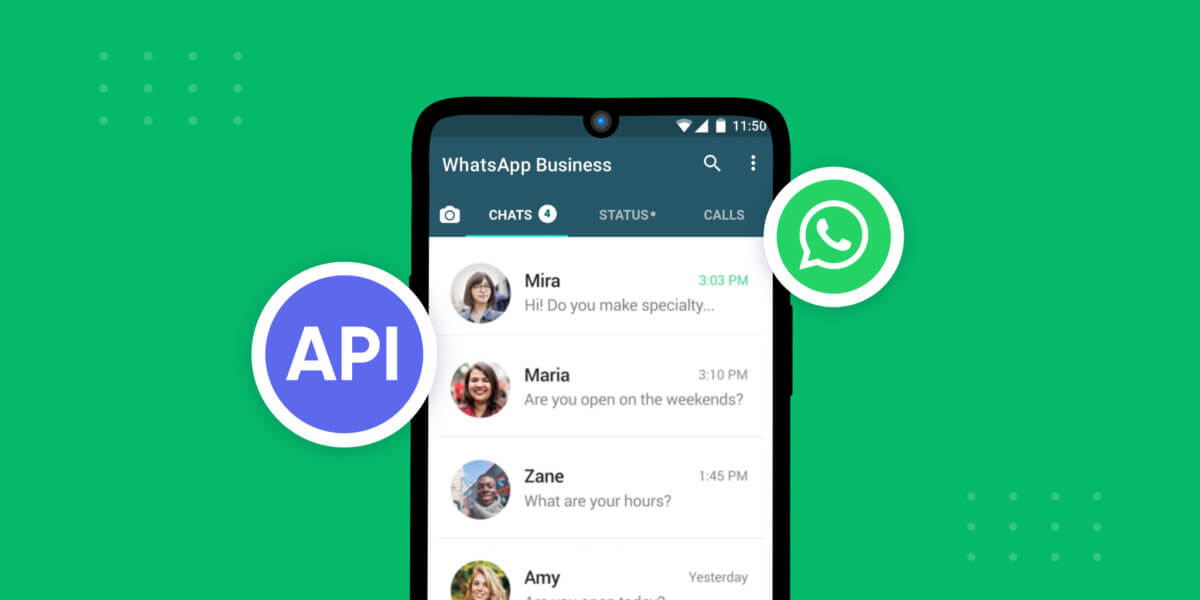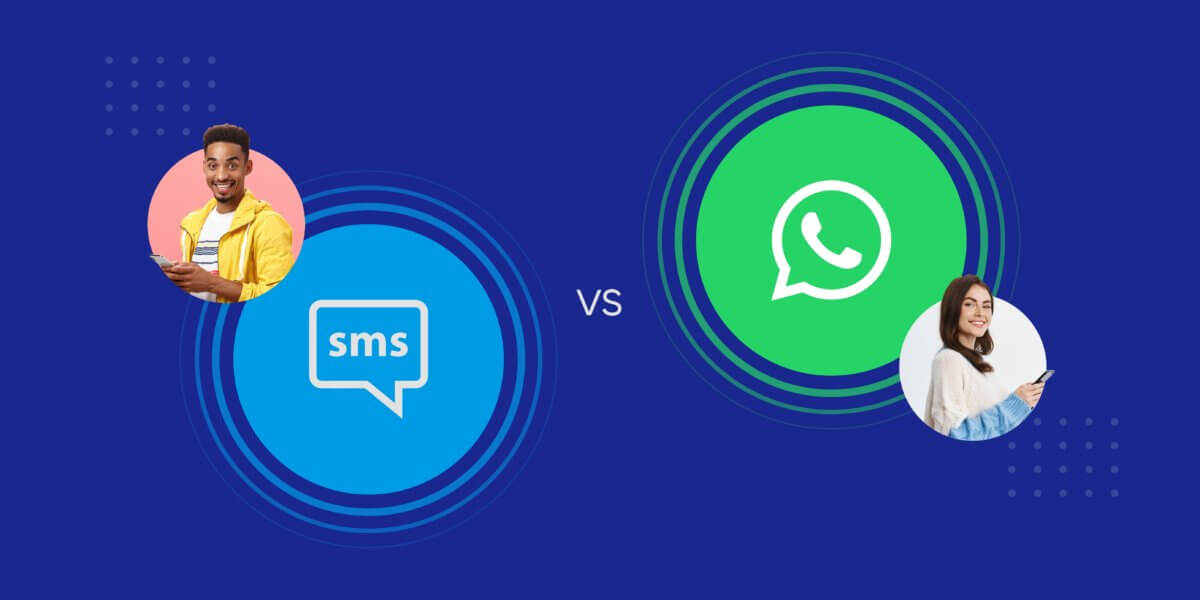Does Meta Offer WhatsApp Open API to their Business Users?

Does Meta Offer WhatsApp Open API to their Business Users?
When the news broke out that Meta, then known as Facebook, had introduced WhatsApp API, it created a ripple in business-customer communication. Meta saw a huge surge in businesses opting for WhatsApp API.
And why not? WhatsApp API turned out to be a boon for customers and businesses alike. There was another faction that benefited from this. The developers. Customers got a seamless experience, businesses found it cost-effective and for developers, it reduced their workload due to less coding.
Given the success, there is a demand for WhatsApp’s open API. Businesses and developers want to know “if WhatsApp offers an open API?”
We answer this question in our blog and also cover what alternatives businesses have to improve their customer communication.
Does WhatsApp have an open API?
The answer is no. An open API is freely available to software developers through an open-source network. And WhatsApp doesn’t provide an open API to its business users. It’s a closed system.
There are two main reasons why WhatsApp doesn’t provide an Open API option.
- WhatsApp prides itself on providing pleasant, spam-free customer experiences and stands its ground when it comes to this. If businesses get free will with an open-source API, they can misuse it to spam users with promotional messages.
- Another reason WhatsApp doesn’t provide an open API is the WhatsApp commerce policy. The policy prohibits certain types of businesses to transact on WhatsApp and if it opens the API, then they will lose control over who uses it and how.
Now, another question that is frequently asked is “Is WhatsApp API Free?” Again the answer is no.
WhatsApp offers two APIs
- Business API
- Cloud API
One is hosted on a Business Solution Provider’s (BSP) server and the other on Meta’s server. Cloud API is slightly cost-effective compared to Business API as you can save money on hosting servers. But then, you’ll miss out on the advanced features that a BSP provides.
To understand these two APIs better, let’s look at how they differ from each other.
WhatsApp Business API: Scale customer interactions with ease
After the success of WhatsApp business for small businesses, WhatsApp launched the WhatsApp Business API.
Aimed to serve medium and large enterprises, WhatsApp Business API offers AI-driven customer support and service automation of business processes.
WhatsApp offers the WhatsApp Business API through an official partnership with a Business Service Provider (BSP). Businesses opt for WhatsApp Business API because
- It uses the power of messaging to work for your business.
- Your customers are already on WhatsApp, so it’s easy to connect with users from anywhere in the world.
- It drives two-way conversations that’ll help you drive your marketing and improve your sales and support.
- You can leverage the power of business API to create amazing experiences with interactive CTAs, dynamic product lists and engaging conversations.
- You can integrate it with your customer databases to sync information in real time and provide a holistic and personalised experience.
To know more about how WhatsApp Business API benefits your brand here is some suggested reading:
Difference between WhatsApp Business and WhatsApp Business API
Master Your Way to WhatsApp Business API: A Definitive Guide
How to Create a WhatsApp chatbot for Business
All You Need To Know About WhatsApp Business Pricing In 2022
How WhatsApp Enables Complete User Journeys
WhatsApp Cloud API: Open to all businesses for free
After the launch of WhatsApp Cloud API by Meta for beta testing in November 2021, Cloud API is now available to all businesses globally.
Cloud API acts as the cloud-based version of the company’s WhatsApp Business API. With the new Cloud API hosted on Meta’s services, WhatsApp Business users can implement WhatsApp API without the cost of hosting on their ‘own servers.’
The new tool is built to make the start-up process on WhatsApp easier, for any size of business, anywhere across the world. This will help all kinds of businesses to connect with their audience easily.
Along with the better customer experience, it will help businesses cut down on costly server expenses, further providing them with instant access to new features.
It also aims to provide new links for “click to chat” which will be customisable, helping businesses to attract clients throughout their online presence.
Read more about the features and pricing of Cloud API and its pricing in our article here:
All You Need to Know About WhatsApp Cloud API
Summary of Business API vs Cloud API
| Sl. No. | Key Differences | WhatsApp Business API | WhatsApp Cloud API |
| 1 | Hosting | Individual businesses and/or BSP’s own servers and data centres | Meta’s servers |
| 2 | Costs | 1. Pay for setting up and maintaining servers. 2. Conversation-based messaging charges as per the rules. | 1. No extra cost for setting up or maintaining servers. 2. Conversation-based messaging charges as per the rules. |
| 3 | API Protocol | Rest API | Graph API |
| 4 | Message Throughput(Per Second) | Send up to 70 text messages per second for single-connect. Send up to 250 text messages per second for multi-connect. Sending media messages may reduce these numbers. No limit on receiving messages. |
Up to 80 messages per second for sending and receiving combined for one business number and many consumer numbers. In the event of high system loads, a business may experience reduced message throughput. Starting in July 2022, Cloud API will support up to 250 messages per second of combined sending and receiving (inclusive of text and media messages), by request. |
| 5 | Single-tenant vs. Multi-tenant | Single-tenant (single phone number per deployment). | Not applicable. Multiple phone numbers can be registered on Cloud API. |
| 6 | Media Provider API | Supported | Deprecated. To upload media to the Cloud API, there are separate instructions. |
Bottom Line
Since WhatsApp doesn’t offer an open or public API for businesses, you can opt for it only through the WhatsApp Cloud API or Business API platform.
Depending on your requirement and budget, you can opt for either of the solutions to provide delightful customer experiences and engage them in meaningful conversations.
WhatsApp is also leading the conversational commerce industry by providing various features that enable an end-to-end shopping experience in one single window of chat.
So if you are looking to explore WhatsApp chatbot for your business and want to
- unload agents from repetitive questions (see how Lido learning moves to 100% chat support) or
- respond to customers in less than 10 seconds (learn how Scribox automates 70% of customer queries and reduces FRT to 10 seconds with WhatsApp chatbot), or
- re-engage customers on their favourite channel (listen to Quipper talk about how they used WhatsApp chatbot to re-engage customers) or
- onboard your customers to reduce drop-offs as Midtrans did,
then talk to our experts. Schedule a demo today and understand what you can automate, how you can improve agent productivity and delight customers with seamless support experiences with Verloop.io.








